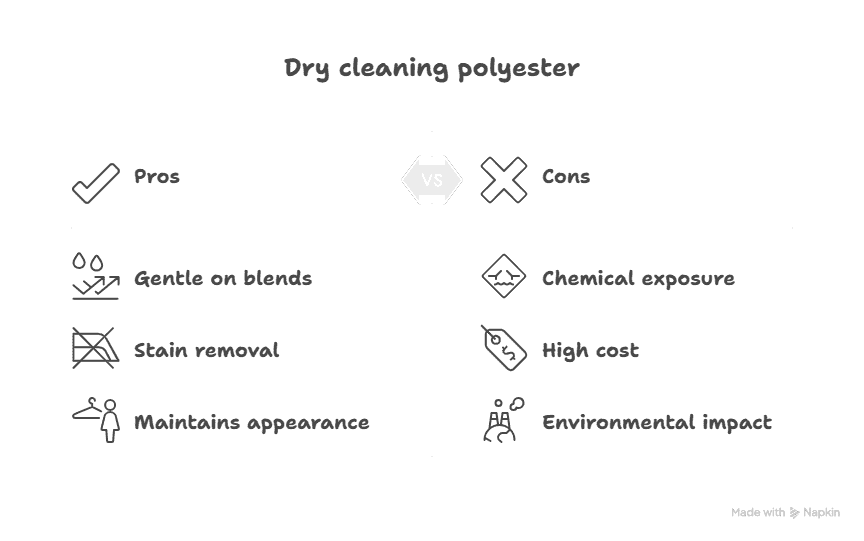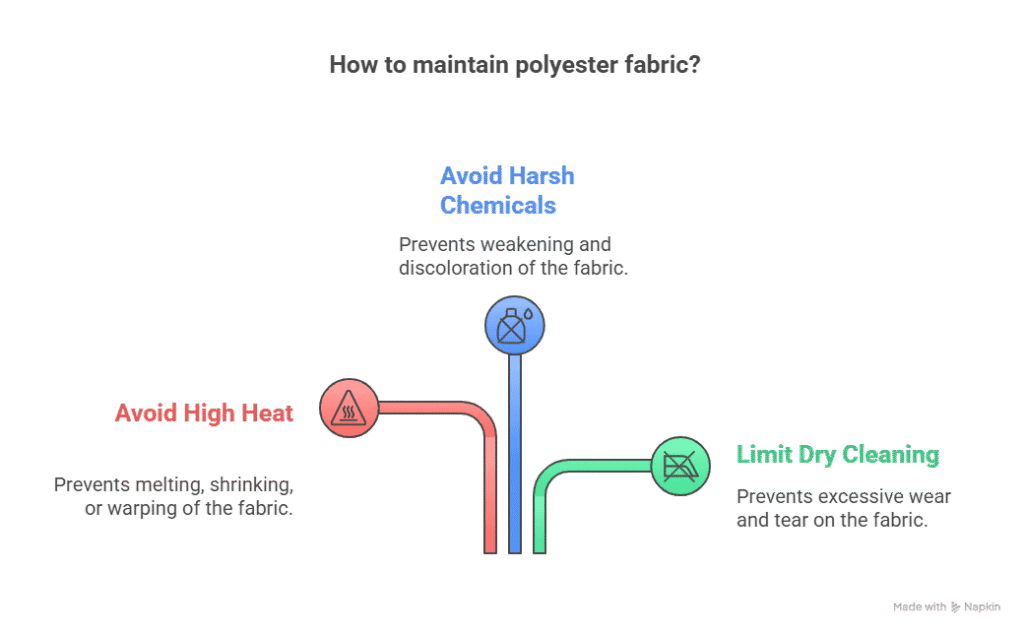Introduction-
Polyester is highly available synthetic fabric across the globe. It is trendy due to the strength it has, wrinkle resistance and it maintains the shape even after being worn very many times. Polyester can be used as clothes, upholstery, sports and even at home. It is durable and affordable to use, and this may explain why people keep on using it in fashion and household needs.
Nonetheless, many people ask a question when it comes to cleaning matters; can I dry clean polyester? This often arises in confusion in cases of care labels that say Dry Clean Only or Dry Clean Recommended. Although taking care of polyester is usually very simple, the appropriate cleaning process may vary depending on the type of garment and the fabric mixture/panel construction. This guide tackles all the information you should know.
Can You Dry Clean Polyester?
Yes, you can dry clean polyester, in fact many polyester items are taken to the dry cleaner. Polyester is a hardy synthetic fiber and professional cleaning will not usually damage it. Nonetheless, in numerous occasions dry cleaning is not obligatory since nowadays polyester can also be safely laundered on the household level.
Still, there is the so-called Dry Clean Only label on some garments. This is usually the case in polyester mixed with fragile material such as silk or wool or items of structured designs such as suits. The label is meant to safeguard the look and form and adornments of the fabric. Hence on one hand polyester is washable, but on the other hand the construction of the garment could necessitate professional care.
Pros and Cons of Dry Cleaning Polyester

Pros of Dry Cleaning Polyester
- Dry cleaner is easy on blends: Dry cleaning will be easy on blends such as polyester-wool or polyester-silk. It does not produce shrinkage and distortion as a result of water based washing. This aids clothes to retain their shapes and colors.
- Removes tough stains: The solvents dry cleaning removes stubborn stains that can be overlooked by water. It actually works well to remove grease and makeup and other hard to remove spots without rough scrubbing.
- Keeps looking good: Dry cleaners cover pressing and the clothing will be returned pressed and flat. This will maintain a silk appearance to suits, dresses and other quality clothes.
Cons of Dry Cleaning Polyester
- Exposure to chemicals: Conventional dry cleaners (such as perchloroethylene) are abrasive to fabrics and cause residues. In the long run, such chemicals can erode fibers (perc is regarded as a potential carcinogen. The contemporary cleaners minimize the exposure to the solvents, yet this is not zero.
- Greater expense: Dry cleaning is costly as compared to home washing. It is a few dollars per piece to clean every garment. That is a big bill when you have lots of polyester products.
- Environmental effect: Quite a number of the dry cleaners chemicals are not environmental friendly. They are able to contaminate air and water. Though greener solvents are in existence, traditional dry cleanings contribute significantly to the environment than a machine washing.
How to Safely Dry Clean Polyester at Home
Instead of going to a cleaner, you can try these gentle home methods:
Home Dry Cleaning Kits
For example, home dry cleaning kits (Dryel, Woolite, etc.) can freshen polyester at home. They include a special dryer bag and cleaning cloths. You place the garment and a cloth in the bag, then tumble-dry. The steam loosens dirt and odors. This method is gentler than traditional dry cleaning and avoids harsh solvents.
Hand Washing with Mild Detergent
Hand washing is a safe option if allowed. Use cool water and a gentle detergent. Soak and gently swirl the polyester item for a few minutes, then rinse thoroughly. Press out excess water (do not wring) and lay flat or hang to dry. This method avoids all harsh chemicals and is very gentle on polyester fibers.
Machine Washing (Gentle Cycle)
Additionally, many polyester clothes can be machine washed on a gentle cycle. Set the washer to cold or lukewarm water (never hot) and use mild detergent. Turn the item inside-out and wash it with similar fabrics. After washing, air dry or tumble dry on low to avoid shrinkage. This is effective for most sturdy polyester garments.
What to avoid when Cleaning Polyester
In a bid to maintain your polyester in good shape, avoid:

High Heat
Keep away from high temperatures because Polyester is heat sensitive. Polyester may be melted, shrunken or warped when subjected to hot water, hot drying, or hot ironing. Practice low or cool heat. Tumble dry on anything useful: medium or low in a home kit. Conclusively, when exposed to heat, damage can be avoided.
Harsh Chemicals
Polyester should not be washed in chlorine bleach or strong solvents. The fibers can be weakened by harsh chemicals, thus, leading to discoloration. Rather, apply stain removers and detergents which are marked as being safe in synthetics. Make sure you rinse off cleaning products. This keeps in check the strength and the looks of the fabric.
Too Many Dry Cleaning
Although polyester is durable as a fabric, excessive use of dry cleaning may exhaust the garment. Analysts caution that excessive use of dry cleaning may lead to damages. Only on the occasions when it is actually necessary (in case of severe stains, doughy smell set in or before storage, etc.), limit the number of professional cleanings. The above-mentioned gentler home techniques normally suffice when it is time to refresh on a regular basis.
What do polyester care labels mean?
When wondering, can you dry clean polyester, care labels are the answer to the question. When a tag with a label Dry Clean Only is placed on the garment, it is highly recommended to have the garment cleaned professionally because the label is put there to prevent damaging the garment. Dry Clean Recommended implies that it is the safest, but it may be possible to gently wash-wash at home. Machine Washable implies that you are allowed to wash it by yourself.
It also matters that symbols are important. The circle is generally a symbol of dry cleaning. A letter in a circle represents the solvent that is supposed to be used. No dry cleaning: a circle with a cross in. Knowing these care symbols means that you will wash polyester clothes without experimentation.
Does polyester shrink in Dry Cleaning?
Polyester does not shrink very easily and this is one of the reasons that made it so popular. It does not lose its form and size as cotton or wool might after several washes. But, poor dry cleaning processes, e.g. subjecting to excessive heat in pressing, can cause slight damage or distortion. Consequently, though polyester tends not to shrink during dry cleaning, it is advisable to be careful at all times.
Comparing Dry Cleaning vs. Washing Polyester
When should you choose dry cleaning over washing?
- Care label: Follow the tag. If it allows washing, do that. If it says “dry clean only,” take it to the cleaner.
- Cost & Convenience: Washing at home is much cheaper and faster. Dry cleaning costs more and requires a trip out.
- Durability: Surprisingly, polyester fibers usually handle gentle washing very well. A gentle wash often causes less wear than repeated solvent cleaning. Dry cleaning can preserve a garment’s tailored structure, but overuse may weaken fibers.
- Appearance: Dry cleaning yields a crisp, pressed finish (great for suits). Washed polyester often requires ironing afterward. Use dry cleaning mainly when you need that polished look.
In most cases, wash polyester at home whenever possible. Only use dry cleaning for items that truly need professional care.
Common Polyester Garments & their cleaning requirements
Suits and Jackets
Several suits and jackets made of polyester are to be dry cleaned only. Such tailored items are lined and creased so that washing may spoil them. It is important to observe the dry clean label always.

Blouses and Dresses
Most casual dresses and tops of polyester material are machine washable. Frilled dresses (or obviously lined dresses) may require dry clean. In case there are delicate sections in a dress, inquire on the tag.
Sportswear/ Activewear
Sports clothing and exercise wear made of polyester are ones that are expected to be washed regularly. They all usually have a label of “machine wash” or are easy to wear around in doing chores like laundry. Best is home laundering in gentle cycle.
Home Textiles and Upholstery
Polyester also applies to home textile such as sheets, curtains and furniture. Machine Washable Slipcovers, sheets: Fill up with water on gentle cycle. Fixed upholstery usually have the phrase “spot clean or dry clean.”
Green Dry Cleaning Solutions to Polyester
Wet Cleaning
Professional wet clean with water and environment friendly detergents instead of toxic solvents. It is non harmful to polyester and has decreased the environmental degradation.
It is a modern method whereby clothes are cleaned using liquid carbon dioxide. It is very effective, had no harmful residue.
Silicone-Based Solvents
Such solvents are less harsh than conventional chemicals. They are safer to the planet and they maintain polyester fibers.
Conclusion-
So can you dry clean polyester? Sure, you can but you do not have to. Polyester: polyester is strong and, in most cases, machine washable; however, fine blends and tailored garments might need to be handed over to professionals. It is of primary importance to refer to the clothing care label before using it.
Dry cleaning is the safest option to use in high-end polyester garments. Mild detergent and cold water could be used in washing everyday items at home. Think about environmentally-friendly cleaning methods that ensure the preservation of your clothes and the environment. Adequately cared, polyester can keep your clothes fresh, colorful, and durable.
Read More>> About water resistance of Polyester fabric.
FAQs
It depends. Dry cleaning will be useful in case of fine and tailored clothes. But for every day clothes, machine wash is enough.
Indeed, 100 percent polyester can be washed using dry clean. Nonetheless, it normally does not need it unless the care label insists.
It can lose its form, or warp, or lose some decorations. Don’t always wash without checking the labels.

Love the eco-friendly approach, clean and safe simultaneously. Supporting sustainable business. Thanks for caring.
I like how you broke down the pros and cons of dry cleaning polyester—especially the reminder that too much dry cleaning can actually wear the fabric down. One thing I’ve noticed is that polyester blends (like polyester with spandex) sometimes react differently, so checking the label really does save a lot of trouble. It’s a good reminder that the safest method isn’t always the most expensive one.
Great question! Yes, you can dry clean polyester—it’s generally safe and effective for removing tough stains while keeping the fabric’s shape and color intact. Always check the care label first!